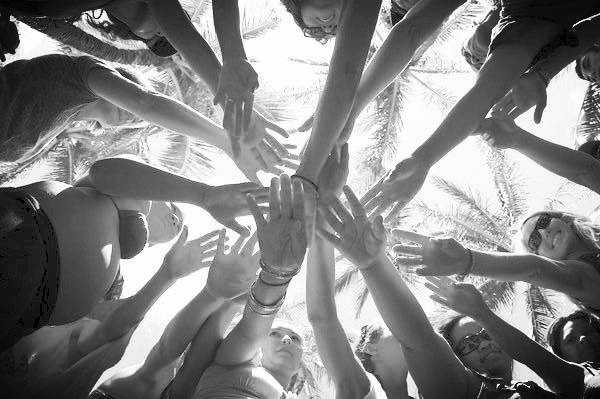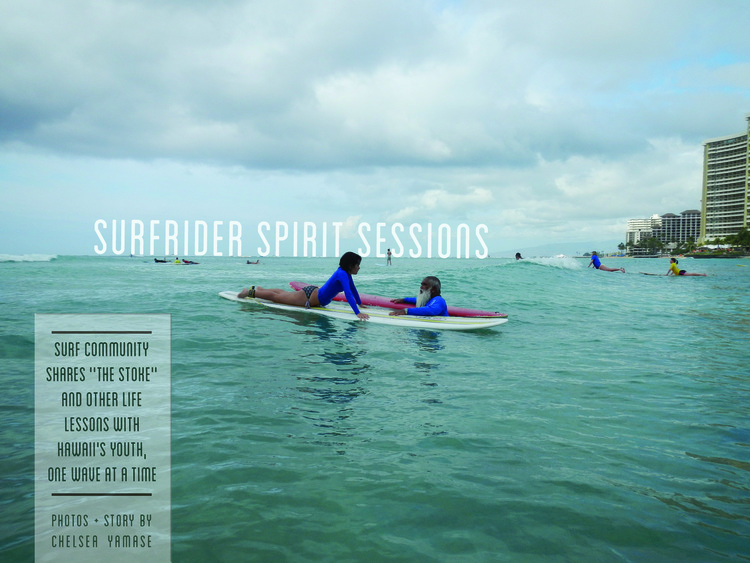
It’s a Saturday morning in Waikiki, and 20 girls in long-sleeve blue rash guards hop around restlessly. The air smells of construction, salt and pancakes from the diner across the street. But no one is looking at the construction. Or at the diner. All eyes are turned towards the white waves rolling in from the horizon.
Some girls grin, braces showing. Others look unsure. For a few, it will be their first time in the ocean in years.

“Eh, girly you know how to swim, yeah?” the big Hawaiian instructor known as Uncle Sam asks one of the participants. The young girl’s pierced lip and dyed hair are at odds with her shy demeanor.
“No,” she mumbles softly looking at the ground. She’s afraid she doesn’t remember how.
Three hours later, the girl stands back on the beach, hair salty and jean shorts still damp from just getting out of the water.
“I was scared at first, but I tried it again and I liked it,” she says almost hesitantly. Then she giggles and starts to smile. “It felt like I was flying.”
That little change is what Surfrider Spirit Sessions founder Cynthia Derosier strives for.
“We are ‘emancipating the minds’, making them believe they can do things they never thought they could do,” says Derosier.
Approximately 8,000 minors in Hawaii are on probation, under supervision or in custody. But in Hawaii’s justice system, Surfrider Spirit Sessions is giving a choice to teens that adjudicated youth in the rest of the nation do not have: to go surfing.
As a community-based non-profit organization, Surfrider Spirit Sessions (SSS) teaches youth in Hawaii’s justice system life lessons and positive social skills through surfing and other ocean activities. Many of the kids initially express skepticism about surfing or even swimming. As the weeks go by and their surfing abilities improve, Spirit Sessions asks them, “If you can do this, what else can you achieve that you didn’t think was possible?”
Building a strong community
At the start of the eight-week program, the staff match each teen with a mentor who becomes their designated “surf buddy” and, program directors hope, a listener and friend. Mentors are volunteers from the community who come from all backgrounds. Among this session’s nearly 40 mentors are a school psychologist, an economist for NOAA, a general contractor and graphic designer. Spirit Sessions likes to keep this ratio of one or more mentors to one mentee to create an environment populated by functional people and potential role models. This network of healthy relationships increases the sense of belonging and encourages the teens to learn pro-social behaviors.
“Me and my mentor, we really connected,” says Sean (last name will be withheld for privacy purposes), who went through the program last session. “It’s someone to talk to, someone to be with, someone to talk about your problems.”
The Sessions
In order to be ready for the morning session (girls start at 8 a.m.) the staff begins packing boards into the van before the sun rises. Volunteers commit to four to five hours every Saturday, but the staff often stays on the beach upwards of 12 or 13 hours. Derosier, now the executive director, along with Program and Development Coordinator Scott Naguwa still surf both sessions every Saturday, filling in if there aren’t enough mentors, lecture and host “talk story” sessions after surfing. Despite this, Program Manager Sam Rodrigues (known to most of the kids as Uncle Sam or Santa Sam due to his round belly and white beard) still thinks the easiest part is Saturday.
“The hard part is getting people to give up their time to be mentors,” says Rodrigues who recently retired from his job as a case manager for the Hawaii State Family Services and now serves as the program manager for Surfrider Spirit Sessions.
But once they come out, volunteers seem to stay; many of the mentors were returning for their fourth or fifth session. All expressed a desire to give back to the community and share “the stoke” of catching one’s first wave.{{To learn about Surfrider from a volunteer’s perspective click the video below.}}
“When you’re out there surfing, all of your problems get washed away,” says Sean, who had never surfed before being in the program. He admits he didn’t believe his mentor or the SSS staff when they told him he would catch a wave his first day.
“Just like that your slate is wiped clean,” he said. “And that for me was a natural high, I didn’t need any drug, I didn’t need to drink, I didn’t need anything negative to make me feel like this.”
Each session closes with a 5-minute “Malama ‘Aina” where the staff, mentors and mentees all clean their stretch of beach of any rubbish and cigarette butts. Last session they picked up around 10,000 cigarettes.
“No matter who you are you always have something to give back,” says Derosier, emphasizing that many of the kids coming through their program have very low self-esteem and only see themselves as a burden on society.
This is all part of the greater SSS mission to get youth of out the “bad land” where confusion, addiction and abuse prevail and into the “good land” which is a place of good citizens and higher aspirations. Surfing, they argue, can connect these two places.
“Most behaviors are linked to survival,” Derosier explains. “They aren’t bad kids.”
While participation in the sessions was court ordered in the beginning, SSS has seen an increasing number of youth requesting referrals to their program. Some, like their current Junior Mentor Manager and two Junior Mentor interns, went through the program and now work for Spirit Sessions.
The staff works closely with the state court system and has a retired judge sitting on their Board of Directors. The court system also supports SSS fiscally with some funding and the free use of a former detention facility which, painted with murals of waves and sunsets, now serves as the Spirit Session headquarters. Derosier says that while judges or probation officers won’t allow the kids out of the detention house for parents or friends, they will let release them to go surfing with their mentor.
History
To say that this program is unique would not be an exaggeration; as far as Derosier knows, it is the only one of its kind in the nation. Started in 2007, Surfrider Spirit Sessions was initially just a program to take adjudicated or troubled teens surfing as a healthy outlet for adrenaline. Over the years the program has grown organically with Derosier estimating that more than 50 percent of the program stems out of the interests of the kids they mentor.
“Really funny things started happening,” says Derosier. “One day the kids showed up and they were like ‘Aunty, I’m kind of stiff can we stretch?’” One mentor that session happened to be a yoga instructor and just like that yoga was incorporated into Spirit Sessions.
“Tourists would try to join out circle, which the kids loved,” says Derosier with her characteristic liveliness. Even the idea of surfing as a way to inspire change came out of a book Derosier authored called “The Surfer Spirit” whose sales helped fund the first pilot of Surfrider Spirit Sessions. Other questions about the reef led to the inclusion of small science experiments taught by a marine biologist mentor.
“The judge and probation officers were freaking out,” says Derosier. “These kids don’t like school but here they are learning about zooxanthellae and ahapua’a.” Out of curiosity, Program and Development Coordinator Scott Naguwa decided to quiz the kids the next week and they remembered.
In 2009, Surfrider Spirit Sessions officially became a registered independent non-profit corporation. While they are currently hosting two 8-week sessions per year, Surfrider hopes to expand their program in the near future.
The Future
The Spirit Sessions team is working with Kapiolani Community College to start a pilot program, called Safari, that will teach college level science courses through surfing and other ocean sports. Naguwa, an avid waterman with a background in environmental science and marine biology, believes anything from physics to meteorology to material science can be taught using surfing.
Derosier hopes it will further combat the prevalent truancy and the “can’t achieve anything” image that many of these kids have of themselves.
“If you can even get them to say they want to attend a college level class, it’s huge,” Derosier explains.
“It’s not about charity, not about ‘oh, poor you’,” says Derosier. “This is about building them up. My goal ultimately is to just help kids so that our community will be stronger.”
comments +